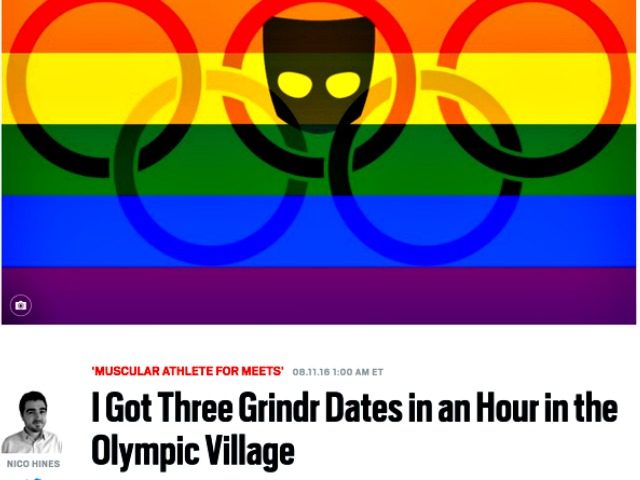A straight reporter who trolled the Olympic Village trying to get hook-ups from gay dating apps is under fire for engaging in what some charge is unethical, if not yellow, journalism.
Using apps like Bumble, Grindr, Jack’d and Tinder, Daily Beast reporter Nico Hines arranged numerous hook-ups with closeted gay Olympians and shared the details – with pretty transparent identifiers – in his published article.
The outrage was instantaneous. Gay rights activists blasted Hines for writing what they called a sleazy piece and the Daily Beast for publishing it. The Daily Beast made their public relations nightmare worse by first trying to edit the piece to remove the identifiers of the Olympians targeted and then ultimately taking the piece down.
“The Daily Beast does not do this lightly. As shared in our editor’s note earlier today, we initially thought swift removal of any identifying characteristics and better clarification of our intent was the adequate way to address this,” the Daily Beast top brass said in a statement. “Our initial reaction was that the entire removal of the piece was not necessary. We were wrong. We’re sorry.”
That mea culpa was not enough. The outrage ensued because one of the athletes in Hines’ story was not just in the closet, but was from a country with strict anti-gay laws. The indictment was clear – Hines put this Olympian at risk.
“It is still illegal to be gay in Tonga, and while I’m strong enough to be me in front of the world, not everybody else is. Respect that,” Tonga Olympian Amini Fonua tweeted. Fonua claimed that the article endangered people’s lives.
While there is no denying Hines’ move would make the National Enquirer cringe and he was careless in protecting the subjects of his story, can we really put all the blame on him? Is this one reporter the source of the threat? Will firing Hines make this all better?
The only thing The Daily Beast did wrong was expose the myth of social media privacy. People – gay and straight alike – jump on the World Wide Web with the false security that their social exploits are all done behind closed doors.
If a gay Olympian hails from an anti-gay nation and is on one of these apps, he or she has put their lives at risk. It is just common sense.
These folks are Olympians and in the public eye of their anti-gay nations. If some straight reporter with nothing better to do can out them in hours, do they really believe that they are safe from their own governments? And, if they do, it is the fakeness of social media privacy that has betrayed them.
It is the recklessness of engaging in social media irresponsibility that is the threat, Hines was just one of the means to that tumultuous end. He was not the cause, just a symptom.
Make no mistake; this is not just a gay issue. People have lost their collective minds when it comes to social media. America, a nation that respected privacy so much a constitutional amendment was added to protect it, no longer has a clue of what privacy is.
From the backsides of Kardashians to Orlando Bloom in the buff, our celebrity royalty is symptomatic of a people who not only have a disregard for privacy; they don’t want it. Whether you are the star of stage and screen or a bored businessman, people use modern technology in a narcissistic way and then are shocked when their intimate details become public.
But what do you expect? If the NSA can tap any phone, so can hackers. In the case of Grindr like apps and, yes, Facebook, the sad thing is we are the very ones that invade our own privacy.
Gay Olympians are no different. These dating hook-up sites are not testimonials to equality; they are glaring examples of why social media begets bad judgment. And activists that try to frame this as a civil rights injustice are worse than Hines himself because the behavior these apps unleash is behavior that is more dangerous than a flat footed reporter.
Where there was an element of shame in random hook-ups years ago, these apps have liberated individuals from that sense with the false assumption that their actions are private.
But when you use an app that is open to the public and you willingly divulge information to strangers online that you would never do to a stranger on the street, what do you expect?
As long as individuals – gay and straight – fail to protect their privacy and ignore the very public nature of social media apps, there will always be a Hines. The cure is not to shame Hines, it is to rediscover our own sense of modesty.
Joseph R. Murray II is administrator for LGBTrump, former campaign official for Pat Buchanan, and author of “Odd Man Out.” He can be reached at jrm@joemurrayenterprises.com.

COMMENTS
Please let us know if you're having issues with commenting.